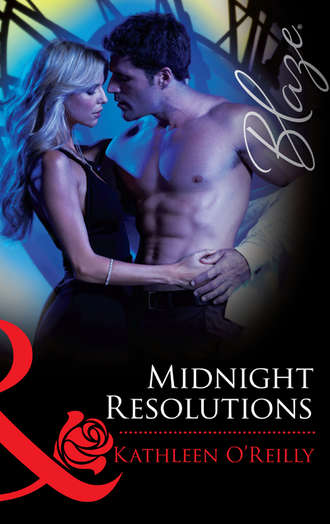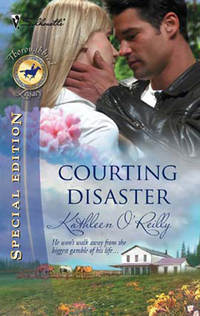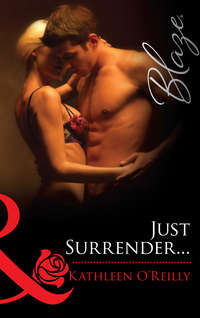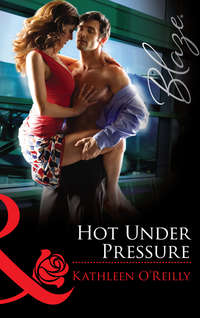
Полная версия
Midnight Resolutions
His hero wasn’t completely buying it. “No, I don’t write fiction. Come on, Mary. Give him a shot. I’ll do anything.”
And those were the magic words she’d been waiting to hear. Ian wondered if he ought to feel cheap, pimping out his investment skills in exchange for work, a habit that was marginally illegal since he wasn’t employed by a licensed broker, at least not presently. On the other hand, it was for the greater good, the ultimate sacrifice, and best of all, his skills stayed razor-sharp.
“Altriva? The dog food company. You heard something?” Ian hunched over the keyboard, fingers flying as if they were born to soar. “Maybe. Give me a second.” He scanned the numbers, catching the six-month-long uptick. “You know this is going to cost you, right?”
Mary knew.
“I don’t come cheap. But the Portland Scientific recommendation panned out, right? The numbers are solid. Liabilities are low. Recently a lot of insider trading, all buys, but I don’t see any clues in the news. It’s definitely trending up. The P/E looks sweeter than my mom’s apple pie, and they have new management. Go ahead, buy. You have my blessing.” Sensing victory within his grasp, Ian strolled back over to his desk and kicked up his feet. “I’ll send Mitchell over for an interview today. Clear the schedule, Mary. You’re going to love him.”
After he rang off with Mary, Ian punched in Mitchell’s number.
“Mitch, my man, it’s Ian. You need to turn off the daytime talk shows and break out the suit. Interview at Scholstein, Harden, today at four. It’s a junior position. Sorry about that, dude, but I have great faith in your abilities to turn a silk purse into something even silkier. After all, you are in advertising.”
For the next five minutes, Mitch cooed and oohed, expressing his undying gratitude until, embarrassed by the compliments and accolades, Ian made up an excuse and hung up.
The gratitude always hit him between the eyes. When Ian was in banking, his clients were smug, taking their ten percent returns with a clipped nod and a bottle of aged scotch at Christmas. At the employment office, this gratitude felt off. Ian didn’t deserve it. Honestly, there were no miracles working here, none at all. Not like in finance, where miracles occurred by the trillion on a daily basis.
Thinking of his prelayoff life was not a good way to start today. Automatically his hands reached for the polished rock that sat on his desk, tossing it up and down like a baseball. When Ian was seven, he had wanted to be an astronaut. His father had sat by his bedside and solemnly told him the stone was a moon rock. After that, every single night he had slept with the tiny fragment of the galaxy under his pillow. By the age of nine, he wanted to be a basketball player, and his father had said that it was a piece of foundation from Madison Square Garden. However, by the age of nine, Ian was smarter and wiser, and called his dad a big, fricking liar. His father had gazed at him, man to man, and told him the rock’s initial place of residence didn’t matter. The most important thing, according to his father, was to think about the rock’s final destination. A rock could be moved from place to place, but where it ended up was a lot more important than where it started.
Being a cocky nine-year-old, Ian had rolled his eyes and drawn out Da-ad to a long two syllables. But when his father wasn’t watching, Ian took the stone and casually tossed it in the air before tucking it in his pocket.
Ian felt his dad’s smile, rather than saw it, and to this day, Ian found myriad uses for his stone. Maybe this wasn’t his final destination, but for now, for today, the victories were starting to smell sweet.
One file on his desk was not smelling so sweet. There were no victories for Hilda Prigsley. For four months, he’d beaten every bush in town—and a few out of town—but sadly, in New York, very few individuals saw the wisdom of taking on an over-fifty teapot-shaped immigrant from the UK. She typed well over one hundred words per minute, one-twenty-two to be exact, but unfortunately believed that computers were the handiwork of the devil. Ian had tried his damnedest to find her something, but positions for a portly Mary Poppins weren’t as plentiful as some might think.
Once a week Miss Prigsley stopped in the office, bringing him a tinful of handmade English biscuits. Ian always called them cookies, because then she would correct him in her proper English way, and he would pretend that he’d forgotten, and she would giggle and smile and he felt as if he’d just charmed his grandmother. If he could only figure out a way to market a sentimental lexicologist, she would be so employed, but reluctantly he pushed her file aside and focused on the nonlexicologist extraordinaires.
By the end of the afternoon, Ian had found two more positions. One for a budding young medical assistant, Deirdre Synder, and one for Mortimer Haswell, a fifty-eight year old mortgage broker who wasn’t happy about a secretarial job and came down to the office to whine in person.
After a few seconds of polite listening, Ian paused for dramatic effect and then held up his stone. He looked Mort in his basset-esque eyes and asked, “Do you know where this came from?”
Mort shook his shaggy gray head.
“This stone is from my first job. Recycling. Now, if you’ve ever worked recycling in this state, you know it’s not a pretty job. It’s not elegant. It’s not one of those run-out-and-brag-to-all-your-friends job. But I did it. Dirty, crappy and I smelled like bad fish until I went to sleep with that smell on my pillow. I stuck my hands in things better left unidentified, and my friend, in garbage, ignorance is the only thing keeping you sane. After my first month, when I was one refuse load away from quitting, I found this stone, winking up at me like a talisman. For seven years I shoveled trash, saving up for college. And let me tell you, on the bright, shiny day I graduated from Harvard, this little stone was tucked under my mortarboard. It was my lucky charm. You gotta see the big picture, Mort. It’s not where you start, it’s where you end up.”
Mort’s unibrow furrowed deeper into his forehead. “I don’t know, Ian. I can’t type.”
Ian was used to the objections and nodded sympathetically. “Yes, you can, Mort. You can do anything you want. Go in there. Make yourself indispensable. You’ll be fine, wait and see. Within a year—tops—you’ll be back in finance where you belong.”
It took a little more convincing, but eventually Mort left—almost satisfied. Ian picked up his polished rock and put it in the drawer. Wasn’t going to need any props tonight. Tonight was all about the shimmer and shine.
When five o’clock rolled around, he watched as the civil servants left before pulling out his suit and studying it with a critical eye. The lapels didn’t have quite the spiffy stiffness that Wall Street required. Some wayward lint had wormed its way under the cuffs, and even an untutored nose could detect the faint aroma of mothballs. Okay, lots of work to be done here.
For the next thirty minutes, Ian toiled away at mothball-scent-removal. Using a combination of high-dollar cologne, an emergency container of Febreze and a twist of lemon, he finally transformed mothballs into something resembling the elusive, yet highly potent, scent of success.
When the cuffs were straight, the collar was angled exactly right and the shoes were shined, Ian admired the finished product in the men’s room mirror. This was the Ian Cumberland of yesteryear, maybe a little skinnier. His chin rose, his smile got slightly harder and his eyes sparkled with that familiar devil-may-care glint. Yeah, that was it. Absolutely perfect.
Watch out, world.
Ian Cumberland was back.
THE RESTAURANT WAS IN the financial district, on the thirty-second floor of the Liberty Towers. The view was spectacular—the lights from the tankers on the Hudson, the skyscrapers across the way, the Statue of Liberty in the New York Harbor—but it was nothing compared to her.
She was standing by the window, waiting, and his breath caught, held.
He’d never seen a woman whose face was so exquisitely formed. Would it always be like that? Did the curators at the Louvre ever stop gawking at the Mona Lisa?
Up to now, Ian had always made fun of the pretentious types who had season tickets to the symphony, idling their time in pursuit of cultural beauty. He never quite “got” that. Growing up in Scranton warped a man’s artistic perspective. But this woman’s perfection stopped his heart.
She turned, smiled, and he wiped the goofy gobsmackery off his face before she saw. Tonight he was the investment banker, a confident man who was never caught being gobsmacked at all.
“Ian Cumberland, at your service for the rest of your life.” He meant it as a joke, but his voice sounded serious. Serious and gobsmacked. He tried to get the devil-may-care look back. Failed.
“Rose,” she answered. “Rose Hildebrande.” Her smile was shy, blushing, and he thought Rose was the exact perfect name.
He took her elbow, twirled her, admiring the flair of her little black dress, the way it crossed over the straining perfection of her breasts, the way it set off the long line of her legs. Sexy, simple. Hot as hell.
“You know, all the guys in there are going to want to kill me.”
Her cheeks flushed, her lashes lowered. “Sorry,” she told him, a bit of hesitation in her voice.
And now he’d scared her. Dude, get on your game.
“No, I’m the one with the apologies. You look lovely,” he told her, leading her inside, seeing the eyes follow them, follow her. Yeah, eat it up, New York. Tonight, forever, she’s mine.
The evening had been meticulously planned, perfectly arranged, each step designed to turn her glorious head. Ian figured that tonight he had one shot to seal the deal. One shot for him to recover his prelayoff charm; it could be done.
The maître d’ greeted him by name, leading him to the designated table, the prime spot at the apex of the windows, where all of New York awaited her pleasure. She looked at the table, stared up at the vent and then—so delicately that only a man attuned to her every smallest movement would notice—shivered.
“Is there a problem?” he asked, praying to God there was no problem; he’d given the maître d’ an extra C-note for that table, and he knew the man wouldn’t give it back.
“No,” she answered, but there was a tiny quiver in her voice.
“If you want to sit somewhere else, honestly, it’s no big. You get cold?”
Her soft blue eyes filled with anxiety. “I’m sorry to be such a pain. My internal thermostat is crazy. I’m hot, then cold. Do you mind?”
“Of course not,” he said, and then gave the ever-efficient maître d’ a commanding nod. “What else do you have?”
“A small table in the back, sir,” he responded, a stodgy whiff of England in his accent. “By the kitchen. Unless you’d like to wait at the bar.”
“I don’t mind the kitchen,” she told him, then pitched her voice low. “It will probably be warmer anyway.”
“Tonight, whatever you want,” answered Ian gallantly.
After they were seated, she balanced her chin on her palm, eyes wide and liquid. She had ridiculously long lashes, shuttering against the golden sheen of her cheeks. “I’m the world’s biggest idiot.”
“Nonsense,” he answered, because he would fight her for that title. Probably win.
“So, Ian. Do you come here often? It’s gorgeous. I love all the flowers.” She sniffed the heavy perfume of the nearby vase of lilies, her glorious breasts filling, creamy skin beckoning to him.
Ian leaned close, ignoring the flowers, his hungry gaze following the line of silken skin, his fingers itching to touch. She noticed, and her mouth twitched with humor. Charmed, Ian shrugged, just as any good investment banker would. “Busted. Sorry. I’m not usually such a carnal-vore. Actually, really, I usually am, and it’s been a long…” Shut up, Ian. Quickly he changed the subject. “My building’s around the corner,” he explained, forcibly removing his eyes from her chest. “We take a lot of clients here.”
“Clients? What sort of clients?” she asked innocently, leading him into the very subject he really should avoid. But why should he be so determined to avoid it? If he was truly a courageous man, he would be honest. Let her evaluate him on his own merits, charm and roguish good looks, rather than his bank account.
Ian hesitated for only a second. “I’m an investment banker,” he lied, opting not to be evaluated on his own merits, charm and roguish good looks. Immediately he glanced around, waiting for lightning to strike. None did. Ian smiled, relieved.
“Still on your feet, I see. No pesky recession to strike you down?” There was respect in her eyes, and Ian knew he’d answered correctly. He loved that flare in a woman’s face, more powerful than a beknighting sword to the shoulder, more satisfactory than when the tellers at the bank had greeted him by name. He exhaled, his chest swelling with pride, completely undeserved.
“I survived, but it’s been tough. A total bloodbath, but they like me. I do a good job for the firm. What about you?” he asked, getting the subject away from him. He didn’t want to talk about his prelayoff job; he didn’t want to talk about his postlayoff life. That pretty much limited the conversation to her, which was fine with him; he wanted to know everything about her, every secret, every dream…every inch underneath her dress.
“I’m a personal assistant. Not as glamorous as you.”
“Still, I bet it’s a cool job.”
“Someday I’m going to do more.”
“Like what?” he asked, reading the uncertainty in her face. He saw it all the time in his world. People adrift, not sure which way to move, frozen into doing nothing.
She shrugged, a small lift to an elegant shoulder. “I’m not sure. Nothing feels right. How did you know that banking was for you?”
“I’ve wanted to be in banking for…pretty much forever. Dad didn’t make much money, and I wanted more. Greedy, I guess.”
“I call that ambition.”
“See, this is why I like you. With spin like that, you should consider a career in advertising.” Automatically his brain shifted to job-finding mode—there was an agency in Park Slope, small, boutique and…Stop it, Ian.
Rose glanced toward the doorway where a waiter appeared carrying a large porcelain vase of two dozen perfect white roses. Handpicked by Ian only two hours before. Every woman’s eye was drawn to the bouquet, longing to be the one, and Ian’s smile got a little more cocky. The man started toward the window.
Walked closer to the table by the window.
Walked even closer to the table by the window.
Finally, with a continental bow, the waiter presented the two dozen perfect white roses to the elderly woman seated at what used to be Ian’s table. Her husband, a white-haired man with silver glasses—and most likely, a fat bank account—beamed, as if he’d given her the world. The wife blushed. Ian seethed. Quietly, unobtrusively, so no one would notice.
“Is something wrong?” asked Rose.
Ian blanked his face. “No. He looks like a VP that I once worked with. Really didn’t like him. Always took credit for the slog he didn’t do. You know the type—they haunt every office of every industry in America.”
“Of course,” she said, but she was watching the couple, her heart in her eyes. “It’s fascinating. He still orders her flowers. Why?”
“Maybe there’s no reason.” Not every gift needed an occasion; sometimes it was just because.
“I don’t think so. There’s always a reason, even if they don’t realize there’s a reason. People don’t give without expecting in return.”
“Wow, beautiful and cynical, too.” He’d assumed that men paid homage to her, built temples and monuments, wrote odes and symphonies. But contrary to her hard words, her gaze was firmly glued to the sight of those white roses and the contented smile on the other woman’s face.
So it was flowers that were her raison d’être? One more piece of data to put in the Rose file. Bring flowers for no apparent reason.
Eventually she looked away, her eyes more firmly entrenched in the here and now. “In the long run, pretty isn’t the big whoop that everyone thinks it is. There are levels in the world. Pretty will get you invitations, five dollars off on your laundry and maybe a free pass on a parking ticket, but that’s as far as it goes. But the man at the top, the one who sits fifty stories above the masses, that’s the pinnacle. He lives life on his terms, and no one tells him what to do.”
Ian felt a cold knot in his gut, and wondered if she had guessed at his sorry truth. “You’re talking about money, aren’t you?”
She nodded once. “Sure. Money, power, control.”
Something flashed in her face—pain? And then the moment was gone, the shutters in place. The impassive Mona Lisa was back and the light began to dawn. This wasn’t about him. This was about her. “He did a number on you, huh?”
“Who?” she asked sharply.
“I have no idea.”
Immediately the wistful dreams reappeared like magic. “I’m not sure what’s bothering me tonight.”
“Don’t want to talk about it? I’m a good listener, and I know absolutely nothing about you.”
“Not much to say. Personal assistant. Moved from nowhere to New York. I manage.”
With a pile of men trailing after her with their tongues hanging out. Like Ian. “So what happened with your date?”
She didn’t pretend she didn’t understand or play coy, and he admired her for that. He liked that. She might sell herself short on brains, but she could read people well. Including him. Politely he dabbed at his mouth, in case his tongue was hanging out, as well.
“His name is Remy. It was our fourth date. He’s very nice. He’s perfect.”
“How perfect?” asked Ian, now surreptitiously checking for hidden cameras, in case this was reality TV at its worst.
“He’s a heart surgeon. Pediatric. Saving small children is a line on his resume. Good-looking. Family money.”
“Cheats on his taxes?”
Sadly she shook her head.
“Undisclosed porn addiction.”
Rose looked at him and laughed. “I don’t think so.”
“Wow. I don’t see anything wrong there.”
“I know,” she told him unhappily.
“Rose? Why are you here?”
“Do you believe in it?” she asked him, her face serious and nervous.
“What’s ‘it’?”
“Fate.”
He could invent something really romantic and magical, something to make her sigh, but she’d probably heard all that before. Instead Ian went with the unremarkable truth. “In the past, I didn’t. I mean, I wanted to, but it never went my way, so it was a lot better for my mental health to think it wasn’t out there.”
“Why not?”
There were a lot of ways to answer that question. Ian chose the least incriminating. “There was this kid in third grade, Kevin Trevaskis, and his parents were a total pain because every year he stayed up waiting for Santa Claus and he never got any presents. But he still believed in this great concept of goodness, even though nothing ever came his way, either. I always felt sorry for that kid. At least, if your parents perpetuate the Santa Claus myth, you have those formative years to hang your hat on, but Kevin didn’t even have that. It was sad.”
“You didn’t tell him the truth?”
Now that he thought about it, it was becoming completely obvious that Ian had issues with truth, even as a young child. Yet now was not the time to dwell on past—and possibly present—indiscretions.
“Who am I to take away his hope? And before New Year’s I’d been thinking about Kevin, thinking maybe he had it right. What if we were the ones who had it all wrong? I went down to Times Square, drinking the enchanting elixir, because for one day, for one second in time, I wanted to believe in that hope, too. I wondered if I’d been missing out. Then I saw you, and I knew. Kevin was right.”
Rose turned a little pale, her eyes wide. Definitely fear.
“Why is that a bad thing?” he asked, not wanting to be insulted, but worried that once again, this was not going to end well, especially in light of Dr. Pediatric Perfection.
“Destiny implies an absence of choice. It means that my decisions, my choices, my words don’t matter. Somebody somewhere is playing chess, and I’m the pawn.”
Relieved, Ian exhaled slowly. “You don’t have strings. You just follow the open doors and see if you like where it leads.”
“Doors aren’t good. Doors can be shut.”
“Doors can be opened.”
“But you’re an idealist,” she pointed out. He’d never thought of himself as an idealist before, and she was wrong, but he liked that she saw him that way.
“So you don’t think this…is fate?”
“I’ve thought a lot about it since that night. I’m not a big romantic. But you make me want to believe in something nice.”
When he looked at her, he could see the ghost of Kevin Tre-vaskis. Hope and fear battling it out. Ian’s feelings were much more defined. Rose made him believe in a better road ahead, in soul mates bound by a single kiss—and then, of course, getting her naked, not specifically in that order. Prudently, Ian shook off the lust and then deflected the conversation to her.
“How come you’ve never married?” He couldn’t wrap his head around the fact that she’d stayed single, sexy and beautiful for this long.
Again she fiddled with the silverware, hesitating. Eventually she decided to trust him. Rose looked up, her eyes not so hard, now almost wistful. “I keep thinking that something better is out there. Like I’m missing out. You ever run up to the crosstown bus stop just as the driver’s pulling away, and you know that was your bus, but you can’t see the number, so you stand there for a minute, not sure if you need to start walking. That’s the way I feel about the men in my life. That I’ve just missed the bus, but I don’t know if I should start walking or wait for the next bus.”
Конец ознакомительного фрагмента.
Текст предоставлен ООО «ЛитРес».
Прочитайте эту книгу целиком, купив полную легальную версию на ЛитРес.
Безопасно оплатить книгу можно банковской картой Visa, MasterCard, Maestro, со счета мобильного телефона, с платежного терминала, в салоне МТС или Связной, через PayPal, WebMoney, Яндекс.Деньги, QIWI Кошелек, бонусными картами или другим удобным Вам способом.









